
Professional Development – By Steve Woodruff
In a noisy world, it’s a challenge to stand out
 You’re a nobody. Just another look-alike penguin on the ice floe.
You’re a nobody. Just another look-alike penguin on the ice floe.
OK, actually, that’s not true, even if it feels like it at times. You are a uniquely gifted individual with vital skills and experience. So how can you express who you are (and what you do best) so that your value is evident to others?
In a noisy world filled with a constant swirl of people and information, it’s a challenge to stand out. That’s why you need a professional value statement.
Brand Yourself
Some people call it a “personal brand,” because, in some ways, it’s a form of summarizing what you’re all about – just as a product or company brand does in the marketplace. The best brands summarize their purpose and value in a compelling and simple message, with as few words as possible.
Often, people feel that personal branding is “icky” – like some kind of hyped-up false advertising.
But being false or sales-y is not the point here. We want to be brief, true and compelling. Think of it as putting you into words, letting yourself and others know what makes you tick.
In the process of articulating your professional identity, the biggest hurdle is putting aside generic, vague language, such as:
- I implement strategies to create business results.
- I work with multiple stakeholders to develop high-impact solutions.
- I ensure high levels of customer satisfaction.
Commodity, jargon-y statements like these do nothing to differentiate you. It’s almost like saying, “I’m a business drone just like everyone else and that’s why you should hire me.” Just another lookalike, sound-alike penguin.
Stand Out
So how do you craft an effective professional value statement? The first (and most crucial) step is identifying your key words. Begin with the three to five words and brief phrases that others most commonly use when describing you.
Why? Others typically have a much clearer view of our strengths and abilities, because “you can’t read the label of the jar you’re in.”
You might be a visionary. A builder. A motivational leader. A great teacher. A natural collaborator. A driver. A self-sufficient solo performer. You might be known to be persuasive. Empathetic. Creative. Adaptable. Organized.
You might find key words from Strengths Finders or DISC or some other assessment platform to be helpful in describing your unique constitution.
Look back on your most notable professional successes and ask, “What is it about my makeup and performance that was so exceptional?” “Why am I great at this …and not so great at that?”
You might look over the landscape of your professional history and conclude, “No wonder I hated that desk job. I’m an energetic extrovert that loves conquering new ground, and that job was just filling in spreadsheets.”
The Right Foundation
Those keywords are the foundation stones of your professional value statement. They are also the fuel that feeds your confidence in the marketplace. Why is this important? There are two major reasons:
- We all need a north star to help us determine our career direction. Knowing(and articulating) our professional DNA and sweet spot removes 90% of the uncertainty of deciding which course to take – or, at the very least, which course not to take.
- Other people will either hire or recommend us for roles. We want to be able to give them our keywords so that they can intelligently look for the best opportunities that match our skillset.
Working on your key words and unique value statements can be an immensely liberating exercise, especially in a group setting where others can give their input. I can hardly think of a more important source of professional direction and effectiveness than having a firm grasp of our unique identity.
A nickname, or a tagline, or a brief sentence, a metaphor – these are effective verbal formats you can use to craft your value statement. They’re memory darts, because they are very small word packages that can more easily stick, and make you stand out above the noise.
Conclusion
Once you know your keywords, you can tell stories that illustrate why you are most valuable in specific types of work roles. Keywords, stories and simple statements of your unique value mean that you will not be “just another penguin” in the minds of others.
And, in your own mind as well.
 Steve Woodruff is president of Impactiviti/ClarityFuel and one of the 2022 LTEN Members of the Year. Email Steve at stevew@impactiviti.com.
Steve Woodruff is president of Impactiviti/ClarityFuel and one of the 2022 LTEN Members of the Year. Email Steve at stevew@impactiviti.com.








